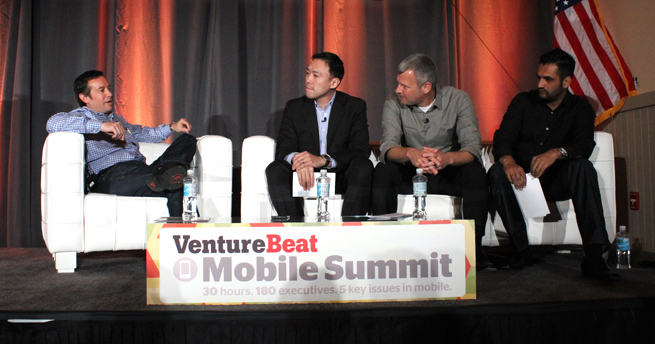Among iOS, Android, BlackBerry, and Windows Phone, a mobile platform war is raging. At the VentureBeat Mobile Summit today, three key mobile representatives discussed the current battles and where they might go tomorrow.
[aditude-amp id="flyingcarpet" targeting='{"env":"staging","page_type":"article","post_id":411885,"post_type":"story","post_chan":"none","tags":null,"ai":false,"category":"none","all_categories":"business,mobile,","session":"C"}']On stage, moderator Robert Goldberg of Crossroads Ventures sat down with Wallace Pai, the VP for Motorola Mobility; Sundeep Madra, the co-founder of Xtreme Labs; and Aleksandar Mitrovic, SVP for Technology and Platforms for Deutsche Telekom.
The session humorously began with Goldberg asking the audience to split themselves by platform: Android to right, iOS to the left, and “everyone else in the back.” It might not surprise you, but the majority of this highly select group of executives mostly carried iOS devices.
AI Weekly
The must-read newsletter for AI and Big Data industry written by Khari Johnson, Kyle Wiggers, and Seth Colaner.
Included with VentureBeat Insider and VentureBeat VIP memberships.
But as much as the panel started on a biting note about division, the panelists shied away from bashing anyone throughout their discussion. Pai of Motorola could have easily made some potshots at iOS, but instead he played the civil cheerleader.
“Speaking from our own experience, we were the first one to bet on the Android system,” Pai said. “There wasn’t an ecosystem. but we knew a horizontal platform could take off. From that point of view, we clearly made the right choice.”
The only real platform bashing came in the form of silence about other platforms. The conversation mostly focused on iOS and Android, and only at the end of the discussion was Windows Phone briefly mentioned. BlackBerry wasn’t taken seriously for a minute.
Deutsche Telekom’s Mitrovic admitted that the platform wars were a good thing since his business’ customers would only be helped by healthy competition and giving them devices they want. One point he stressed was that Android tablets aren’t a joke in Europe like they are in America, where the iPad dominates store shelves. “In Germany, the Android tablets are next to iPad, not delegated to the back of the store,” Mitrovic said.
Xtreme Labs’ Madra, who works with all kinds of mobile companies on strategy, made a point of cheerleading for both Google and Apple. He said Apple had a 10-year lead with iTunes and Google had done a great job of catching up to that with its own offering. But he said Apple was the clear winner in the tablet space.
“If the iOS and Android tablets are similarly priced and have similar features, nine times out of 10 consumers choose the iPad,” Madra said.
[aditude-amp id="medium1" targeting='{"env":"staging","page_type":"article","post_id":411885,"post_type":"story","post_chan":"none","tags":null,"ai":false,"category":"none","all_categories":"business,mobile,","session":"C"}']
At the end of the panel, all three participants shied away from naming a winner in the mobile platform wars. But no doubt they will rage on. Frankly, I can’t wait to see how Windows Phone begins to disrupt the market; hopefully we’ll hear more about it at the next Mobile Summit.
“By 2020, there will be 100 billion connected devices,” Madra said. “There’s a lot of room for many platforms.”
Mobile Summit photo: Heather Kelly/VentureBeat
VentureBeat's mission is to be a digital town square for technical decision-makers to gain knowledge about transformative enterprise technology and transact. Learn More
